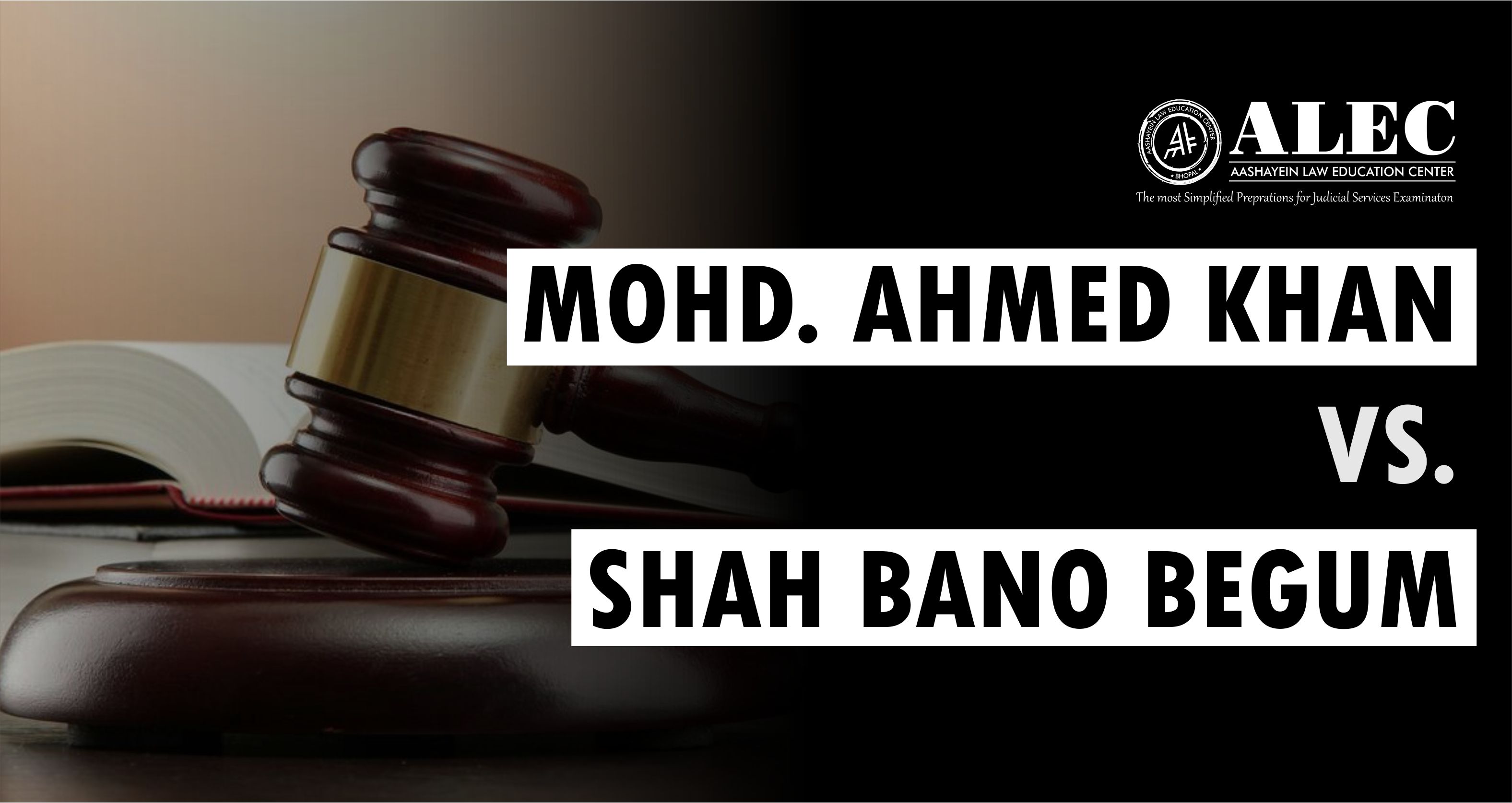Mohd. Ahmed khan
v.
Shah bano begum
AIR 1985 SC 945
BENCH
Justice Y. V. Chandrachud, Rangath Misra, Justice D. A. Desai, Justice O. Chinnappa Reddy, Justice E. S. Venkataramiah
FACTS
In 1972, Shah Bano, a Muslim woman, was married to Mohammed Ahmad Khan, an affluent and well-known advocate in Indore, Madhya Pradesh, and had five children from the wedlock. After 14 years, Ahmad Khan took a younger woman as second wife and after years of living with both wives, he abandoned Shah Bano, who was then aged 62 years and promised her to pay Rs 200 per month. In April 1978, he stopped giving the said money to Shah Bano, she filed the criminal suit under Section 125 of Criminal Procedure for Rs 500 as maintenance. In November 1978, her husband pronounced triple talaq and contended that she ceased to be his wife and hence he is not liable to maintain her and gave her total ₹5,400 prescribed under Islamic law. In August 1979, the local court directed Khan to pay a sum of ₹25 per month to Bano by way of maintenance. On 1 July 1980, on a revisional application of Bano, the High Court of Madhya Pradesh enhanced the amount of maintenance to ₹179.20 per month. Khan then filed a petition to appeal before the Supreme Court claiming that Shah Bano is not his responsibility anymore because Mr. Khan had a second marriage which is also permitted under Islamic Law
ISSUES
Ø Whether the “WIFE” definition under Section 125 of CrPC includes a divorced Muslim woman?
Ø Whether Section 125 CrPC overrides personal law?
Ø Whether a Muslim husband’s obligation to provide maintenance for a divorced wife is in or not in the conflict between section 125 and Muslim Personal Law?
Ø Whether dower is a sufficient sum payable as maintenance?
You can also read the Blog by visiting [Blog]
For more information, visit [Aashayein Enquiry Section]
JUDGMENT
The Supreme Court of India held that Section 125 of Criminal Procedure Code 1973 is a secular provision and hence applicable to Muslims also. Therefore, in this case, appellant i.e. husband was made liable to pay maintenance to his wife as she was unable to maintain herself.
ANALYSIS
The Shah Bano's case is one of the most important judgments of Indian History. This case changed the legal and political conditions of the country. The judgment of this case was regarded as the one step closer to the implementation of Uniform Civil Code as enshrined under Article of 44 in the form of Directive Principles and States Policy.
The Court gave the following reasoning on the issues of the case:
1) “WIFE” definition under Section 125 of CrPC includes a divorced Muslim woman
The Apex Court said that the Section 125 of the Criminal Procedure nowhere mentions about religion therefore it would be irrelevant to state that this provision applies to a particular religion. Furthermore, the provision is a part of criminal procedure and not of civil nature therefore, to assert a religious colour to this provision is not appropriate. Hence, Section 125 of the CrPC is a secular provision and includes divorced Muslim woman as "wife' unless remarried.
2) Overriding effect of Section 125 over personal law
The Apex Court regarding this issue stated that Section 125 has an overriding effect over personal law. The court in order to conclude this issue compared it with polygamy provision under Muslim Law. It stated that Muslim person in India is allowed four marriages, therefore the explanation confers upon the wife the right to refuse to live together with her husband if he contracts another marriage, leave alone three or four other marriages. It shows, indubitably, that section 125 overrides the personal law if is any there conflict between the two.
3) Muslim men obligation to provide maintenance to their wives
The court has already settled the issue that Section 125 has an overriding effect over Personal Law therefore if the wife is unable to maintain herself then the Muslim wife will have the recourse of Section 125. Hence, the Muslim men is obligated to maintain his wife not until the iddat period but after the expiration of that as well if she is unable to maintain herself.
4) Dower a sufficient sum of maintenance
The Apex Court again reiterated the same ground that Section 125 is a secular provision therefore, the amount of maintenance will be other than the amount of dower. However, dower can be considered as a ground of reduction of maintenance amount but the maintenance amount under Section 125 is not inclusive of dower.
The Shah Bano verdict stirred the events in the country and therefore to overturned the verdict Rajiv Gandhi government passed Muslim Women (Protection on Divorce Act), 1986 wherein the period of maintenance was restricted to the iddat period. The Act stated that if a woman isn’t able to provide for herself, the magistrate have the power to direct the Wakf Board for providing the aggrieved woman means of sustenance and for her dependent
children too. The lawyer of Shah Bano i.e. Danial Latifi challenged the constitutionality of this Act in the case Danial Latifi & Anr vs Union Of India (2001) 7 SCC 740 wherein the Apex Court upheld the validity of the Act but it held that the liability can’t be restricted to the period of iddat.
The Shah Bano case, is hence one of the most landmark judgments of India.

